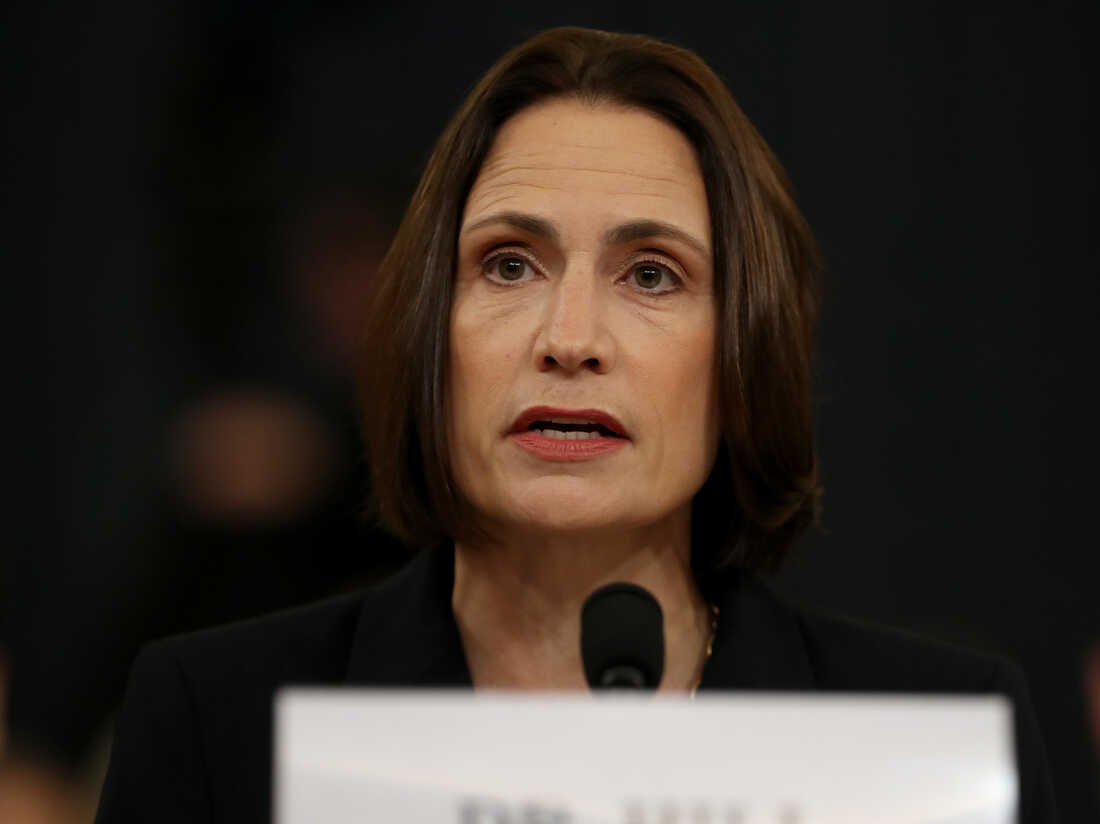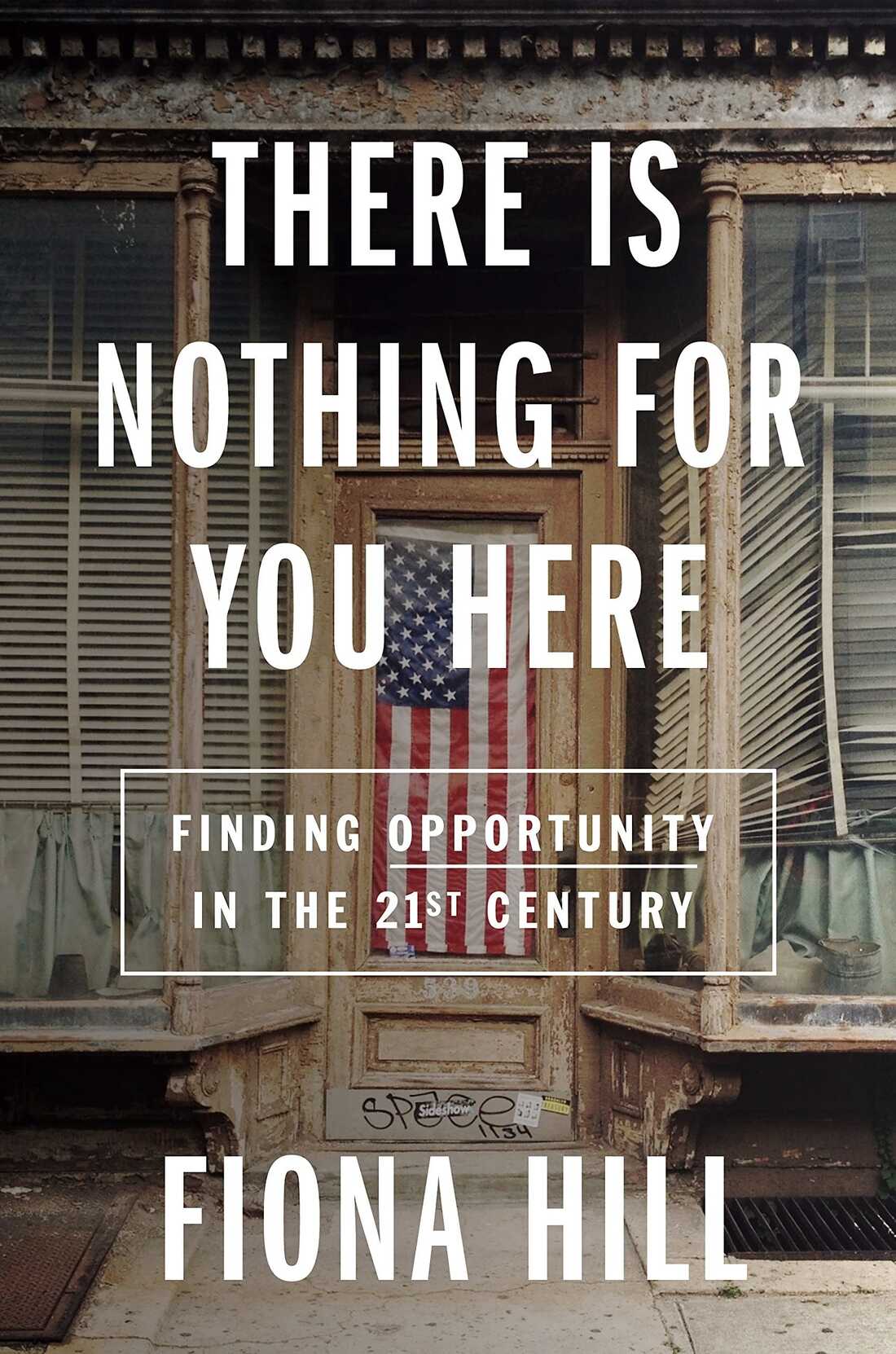
Fiona Hill, the National Security Council's former senior director for Europe and Russia, testifies before the House Intelligence Committee in the Longworth House Office Building on Capitol Hill Nov. 21, 2019 in Washington, DC. Chip Somodevilla/Getty Images
If most people have heard of Fiona Hill, it's probably because of her star turn in front of Congress during former President Donald Trump's first impeachment inquiry.

There Is Nothing For You Here: Finding Opportunity In The 21st Century, by Fiona Hill Mariner Books
Her personal story struck a chord with many. She was an immigrant, who became a U.S. citizen. The daughter and granddaughter of English coal miners. She grew up in poverty and was first in her family to go to college. Her "improbable journey" led her from the North East of England to the White House, where she was an adviser on Russia and Europe for two years of the Trump administration. In many ways, her story is the embodiment of the American success story.
But Hill sees her journey as the exception, not the rule. Her book There Is Nothing For You Here: Finding Opportunity in the 21st Century, examines why it is difficult to get ahead, why opportunities are fleeting and how that is affecting the social and political fabric of the country.
The book is part memoir, part history tome, and part policy prescription. She gets the title from something her father told her in the 1980s. "There's nothing for you here" he said to her, urging Hill to leave her hometown of Bishop Auckland in the North East region of England. Over the course of her father's life, coal and manufacturing jobs went away. With dwindling opportunities, the town got hollowed out and the once thriving area became blighted.
If that sounds familiar, it's because areas like America's Rust Belt have experienced that same hollowing out. Hill came from a place where people felt left behind as economic opportunities moved elsewhere. Where people felt forgotten by politicians and their policies. And she sees that happening in America, where the haves and have-nots "essentially lived in and experienced two different countries."
It's what led, she writes, to Trump's 2016 election.
Now, many readers will be curious about Hill's take on Trump (He cared more about image than substance.), or what it was like to work in the White House (She likens it to working in a mine, "We were stuck together in a confined space just trying to get the job done without losing anyone in a political accident."), or even the experience of taking part in the impeachment process (She describes a staring contest with Rep. Matt Gaetz, an ardent Trump supporter.)
But for me the most striking — and worrisome — part of the book is the Russia connection. No, she doesn't believe Trump was working for Russian President Vladimir Putin ("Trump was only ever concerned with himself."). For Hill the link is that the U.S. is traveling down the same populist road that Russia started down two decades earlier. "Russia is America's Ghost of Christmas future," she writes, "a harbinger of things to come if we can't adjust course and heal our political polarization."
The roots of populist politics that have infused the U.S. (and the UK) can be found in Putin's populist approach of the 2000s. Putin offered narratives for people who had lost their identities and cultural moorings. Putin was straightforward, plain speaking, working class guy who offered scapegoats for Russia's decline. He said only he could fix the problem. Sound familiar?
Putin not only became immensely wealth, he has become an autocrat who has stayed in power for years and will continue. He short circuited Russia's nascent democratic movement, as Hill details.
Trump did not succeed at a parallel here, but not for want for trying. Hill views Trump's lies about the election system that culminated in the Jan. 6 riot at the U.S. Capitol as a "slow-motion coup attempt, perpetrated by Trump to keep himself in power even if he actually lost the election." Trump did what he could to short circuit representative democracy, weaken checks and balances in the system, push out oversight, and sow distrust of institutions, Hill says. It was a stress test of democratic system that was ultimately thwarted by individuals at key institutions, like the military and the courts.
Hill isn't breathing a sigh of relief, though, that American democracy has weathered the storm. Rather she worries that Trump's attempt to hold onto the presidency, "may have paved the way for another, less personally insecure and more capable populist president — someone who actually did his or her homework and was skilled in project management — to pull a Putin in America."
Trump may be out of office, but the divisions between the haves and have nots remain to be exploited by the next populist candidate who claims to speak for the millions of people who feel forgotten, Hill suggests.
To change direction, she writes, we need to heal these political and cultural divisions and increase opportunities for all. Opportunity for Hill came in many different forms — a local elected representative who encouraged educational opportunities for students in the district, a local coal miners' group that provided funding so she could travel to some of those education opportunities. Even the government played a role: The British government provided her scholarship to study at Harvard University, something she would not have been able to afford otherwise.
She is a strong advocate for education and how it can improve a person's life. Education, she writes "is the beating heart of the infrastructure of opportunity." It has the potential to define and redefine who you are and who you will be. For me, it was everything." But she's well aware that that's not necessarily true today. The cost of education, the paucity of public funds to help students, and the amount of debt students can leave with are large hurdles to education. The opportunities that she was able to utilize to help her social and economic mobility are not as readily available today.
A policy wonk, Hill calls for a massive, long-term investment, akin to a domestic Marshall plan, for the country. It is is unlikely to get traction in Congress. But she also offers a list of things people can do within their community to help create opportunity, and enable people to thrive no matter where they live. She says the problems of those who feel forgotten are our problems. And if we don't help fix that well, "there will be nothing for us, anywhere."
"here" - Google News
October 04, 2021 at 06:46PM
https://ift.tt/3l5ViRZ
Fiona Hill explores why it's tough to get ahead in 'There Is Nothing For You Here' - NPR
"here" - Google News
https://ift.tt/2z7PfXP
https://ift.tt/2Yv8ZPx
No comments:
Post a Comment